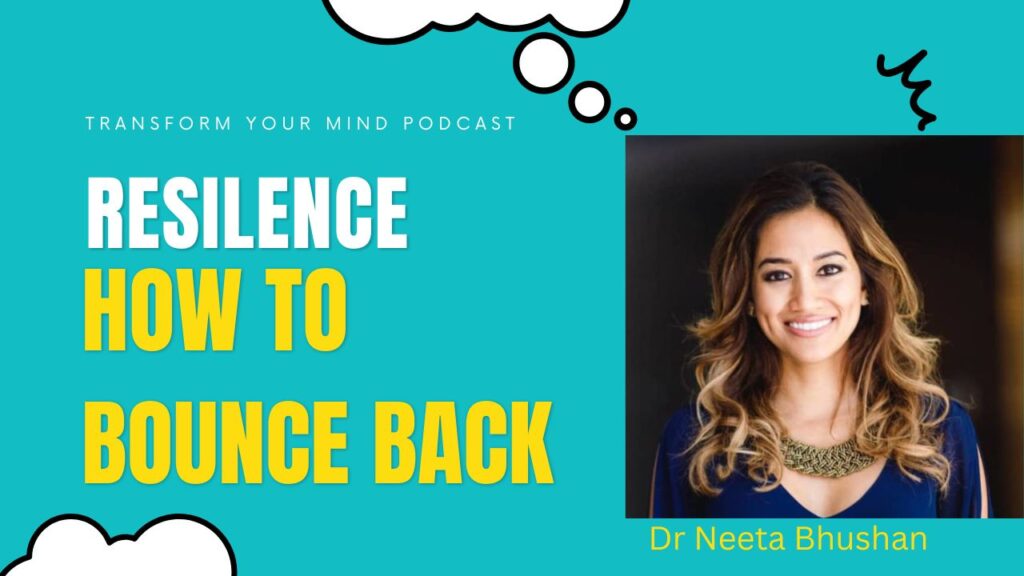After being orphaned at a young age, Dr Neeta Bhushan developed resilience. If you look up the word resilience, the literal definition is to, bounce back. The bounce factor, is your ability to, bounce back, and be resilient when life knocks you down. A glass that holds water is tough, it’s strong, it holds things together, but if let that glass go, it’s going to shatter into a million pieces.
On the other hand, if I have a basketball, it has a little give and if I let it go, it will, bounce back. So we also need a little give. We can’t be rigid. Like the glass if we are rigid then we shatter into a million pieces when we fall. The, bounce factor, is how we become strong and soft at the same time. That is how we, get back up, when life knocks us down.
Download the podcast here:
Bio
Dr. Neeta Bhushan is a cosmetic dentist turned three-time international best-selling author and world-renowned emotional health advocate. She is also the founder of Global GRIT Institute, a wellness education platform for optimizing wellbeing, and cofounder of Dharma Coaching Institute, a coaching organization training coaches to become the highest versions of themselves. Neeta has shared her thought leadership on grit and, resilience, on international stages and as the host of her popular podcast, The Brave Table.
After realizing how trapped she felt running the million-dollar dental practice she built, Neeta embarked on a journey that led her across 45 countries as she researched blending the intersection of human behavior, ancient wisdom, Eastern philosophy, and therapeutic psychology. That knowledge, along with other life experiences overcoming multiple adversities, which include being orphaned at a young age, surviving an abusive marriage, and extensive loss, contributed to the powerful message of resilience she shares in this book. Neeta is a mother of two, and currently lives in Austin, Texas, with her husband and children. Visit her on the web www.neetabhushan.com

The Transform Your Mind Podcast is the #1 Self Improvement Podcast for Women
Check out the FeedSpot List here:
https://blog.feedspot.com/personal_development_podcasts_for_women/
What is Resilience
Myrna: What is your, bounce back, story?
Dr Neeta: I lost my mom at 10 years old and then my brother a year later, then my dad a few years later. I really didn’t deal with the grief until I was in my 20’s. I didn’t really go through the feelings of the loss of my mom, my dad, my brother, I was in survival mode. I just became resilient. I’m like, Okay, we gotta get out of this tunnel. And so getting into my 20s I had all my coping mechanisms on full blast. My coping mechanisms was that I stayed in relationships for too long. Especially romantic ones that didn’t really serve me, because I was afraid of being alone. I was trying to fill that void of loss with someone, anyone.
And I think a lot of times, we do something because it is so painful to go into that void. It’s so uncomfortable to feel those feelings, so we self-medicate with people, sex, drugs, food etc. Today we have the greatest dopamine device ever, our smartphones. All we have to do if we’re having a bad day, is to swipe, or scroll and we feel better. We don’t have to feel it anymore. Or we go home and turn on the TV and we can Netflix all night. These are all activities to stop us from feeling. I did this for years, staying in bad relationships because I didn’t want to feel lonely until my life was in danger and I had to go.
I’m was waking up and this is what I call, flying forward, in my book. That process of, flying forward, after a life situation makes you choose instead of being knocked down, you fly forward. Denzel Washington called it, falling forward. If you have a fall, it could be a literal fall, or metaphorical fall. I teach you how to, get back up, and, fall forward.
Sponsored Ad
Looking for a scientifically tested and strategic way to improve your mental health? Then it’s time for you to download Neurocycle, the world’s first and only brain detox app! Neurocycle is a step-by-step program that you do over 63 days to identify and unwire toxic thinking habits, trauma, and limiting beliefs. The app doesn’t just help you MANAGE INTRUSIVE THOUGHTS, it also helps rebuild healthy new neural networks in your brain.
The Neurocycle app also includes mini guides for in-the-moment challenges, such as a guide to help you work through panic attacks, and a guide for parents to use with kids. Struggling with sleep? Neurocycle also has a guide to help you fall asleep quicker, and stay asleep longer!
The team behind NEUROCYCLE has spent over 30 years developing and testing the Neurocycle system, which has been used to help people who struggle with anxiety, depression, brain injury recovery, and many other life issues. The app is used by over 500,000 people every day, while more than 1.5 MILLION people worldwide HAVE USED THE NEUROCYCLE system to help them change their thinking, including world-class athletes, spiritual leaders, and celebrities.
And, for a limited time, get 50% OFF your first month’s subscription with transform. Go to Neurocycle.app – and use promo code transform so they know we sent you!

Resilience: the ignited stage
Sometimes we are ignited by someone crossing a boundary. In my case, I was not safe. I feared for my life. I was ignited, I had to go. When you’re in so much of that pain that you start letting people in. When the shame is overshadowed by desire to be safe.
I was so ashamed because I grew up with immigrant parents from India and the Philippines. Divorce is a taboo and so it took so much courage and bravery to leave that marriage. You can also get ignited if you have that medical diagnosis or if your child is sick, you just lost a job or maybe you’re just not feeling in that right mindset anymore. You’ve lost it, whatever that was you lost it. There is now a trigger. That says nope, you got to do this.
And that’s the ignition and for me the ignition was I’m leaving, packing my bags and asking for help by telling my aunts and grandmother, the matriarchs that supported me that I was actually in this situation. I was a cosmetic dentist at the time and I remember going into that practice that day and saying, I need support. I cannot do this alone. I don’t know if I can keep his office open because right now, I’m going through the darkest time of my life.
This was the first time in my life that I could actually focus on breathing, that I could actually say the 3 words that saved my life. “I need help.” And I think you know a lot of us go through these stages and times in life where things can get really big. But you always have those three words. “I need help.”
Sponsored Ad
“Attention gamers! Ready to level up without emptying your wallet? Mundus Gaming has the answer!”
“Discover www.mundusgaming.com, the best spot for digital console games at HALF the price!”
“Our secret? Shared accounts! Enjoy the same game license with others and save big! It’s a win-win!”
“Find games for PlayStation, Xbox, and Nintendo Switch in all genres. New releases and preorders at unbeatable prices.”
“Visit www.mundusgaming.com, choose your game, purchase, and play! It’s that simple!”

Flying forward after rock bottom
Myrna: You mentioned your immigrant parents and I’m not quite sure whether it’s an immigrant thing that we have a problem asking for help. But I am from Guyana and I have a very hard time asking for help myself. I always think that, I can do things on my own. So, I’m glad that you were able to put that aside maybe because you were at the rock bottom. And you asked for help and that is great. You mentioned, flying forward. You talk about the, flying forward, framework. What is that?
Dr Neeta: Stage one is, when you when you have that breakup, when you have that fall when you go through a loss when you maybe get sick yourself, when you have financial troubles. You look at your bank account and you’re like, how did I get here? And you have to make a decision, and then we get into that ignition phase where it’s like, are you going to stay? Are you going to go? Are you going to keep doing the same thing? Are you going to ask for help. Are you going to, say you know what? I am going to book a session with my healer, my therapist, my coach, I’m going to sign up for that training because I said I wanted to lose the 20 pounds and I can’t take it anymore. This is where the ignition is.
This is where that fire is lit under our bellies. And we’re like, okay, we’re going to do something completely different. That’s scary. That’s uncomfortable because I don’t want to go back to that reality, that reality is painful. And I’m going to step forward so it’s kind of like we get into them.
Stage three which is the phoenix rising from the ashes. We’re actually asking a different question.

Resilience: Rising from the Ashes
We’re actually saying, Okay, well, this is uncomfortable. This is messy. It’s not perfect. This is a chaotic, and I can’t explain it right now, but I’m feeling a little light and feeling that because I am in this mess. I am rising like the Phoenix Rising, I’m leaning into things that are uncomfortable, so maybe it’s being imperfect. Maybe it’s saying yes to a new hobby, saying yes to something that really scares you that you’ve been putting off. Maybe it’s saying yes to going to the gym with a trainer.
Or we’re or sitting in a time of the suck where it does actually suck and you’re okay with feeling the uncomfortable feelings there because you’ve been suppressing it for far too long. And that’s happened in my case where I said, I don’t even care anymore. There was uncontrollable crying and heaving. Scientifically, the cry signifies us getting closer to ourselves, and most of us are so afraid. Right? And it’s and we’re in and it releases our tears released the cortisol, it’s releasing the stress that we’re holding.
So that the Phoenix rising stage and when we get into the Magnify stage,.
The Magnify stage is, I’m in full acceptance. I’m in full acceptance of my reality right now. I have this new confidence that you know, maybe I am starting to go on dates or maybe I am starting to invest in this thing. Or maybe I am starting to get better at public speaking or whatever the thing is that I want to be able to transform my life with and then we get into thriving.

Bounce back to Thriving
Thriving means that you know, it doesn’t mean that we’re immune to falling again, because it’s a cyclical cycle, right? We are going to have things that challenge us. But thriving just means that now you have things that are built into you that check in with your boundaries. You know, check in with people that support you. I call them my SSP, our sole support policy, and in our sole support policy.
It could be one or two friends, maybe it’s family members you mentioned your amazing parents. Oh my God, it’s amazing that to have people in your life that you can actually lean in on that can hold that space and be present with, who could say I got you don’t worry about this. Thriving also means that you have your personal check in. I call it our POC, your personal observational check in to see how am I actually doing? Do I really want to go to that thing this weekend? Or am I doing it because I’m obliged to somebody else? Can I say no? What will that mean? So, we redefined our boundaries to work for us.
Myrna: Yes, I love that. So, I understand the question now, flying forward is moving from that stuck position and going through the stages to get to thriving. The very first stage is making the decision to do something about it. Your story is your, resilience, and that is why you founded The Global Grit Institute. So it’s almost like that your story helped to build your purpose. So, let’s talk now about the, resilience, because you talk about something that’s called the, bounce factor, to build an increase your, resilience. How do you teach your clients to build this, resilience?

Resilience is not mental toughness
Dr Neeta: Yeah, well, so for those listeners who have ever been taught about, resiliency, or, resilience, we think mental toughness, we think we have to be strong. In fact, when I was growing up, my parents and my dad specifically, he was from India. And he would say, Neeta, you’re so strong. You’re so strong, and I would hear this over and over and over again. And I think that as parents now that I have my own children, I questioned myself whether or not I want to even share that with them because that’s also implying that they also can’t be soft, that they also can’t have compassion for themselves.
When we look at the root of the word, resilience, the root of the word comes from Latin, of course, and it’s resilient, which means the literal definition is to bounce to, bounce back. And so, if I were to take a glass of water, you would say, well, Neeta that glass is tough, it’s strong, it holds things together, but if I actually let that piece of glass go, it’s going to shatter into a million pieces. Right?
On the other hand, if I have a basketball, it has a little give and if I let it go, it bounces back. So we also need a little give. We can’t be rigid. Like the glass if we are rigid then we shatter into a million pieces when we fall. The bounce factor is how we get back up when life knocks us down.

Why we need good stress
We can look at our current environment and ask, are we invoking what I call, good stress? What is that, good stress, barometer? You’re probably asking, why would you want, good stress in your life? Well, good stress, can look like leaning into and exploring your edges, exploring what is comfortable for you. And what is maybe a little bit out of your comfort zone.
I’m saying let’s go into out of our comfort zone. I’m not saying let’s jump out of a plane tomorrow, but maybe, you know, you want to improve your health. And maybe the edge of your comfort zone is walking a mile a day, walking more than 10 minutes maybe the edge of your comfort zone is not eating unhealthy sweets, replacing it with something else. Or maybe the edge of your comfort zone is going, meatless on Mondays or no carbs on Thursdays.
Myrna: Yeah. Wow. The, bounce factor, is the process to help people cope with their setbacks and challenges after their sucky moments? I love that word. Sucky moments.

That Sucked: Now What
Dr Neeta: There’s three parts of the book “That Sucked: Now What.” The first part is that magical moment what you realize that this sucks, we’ve talked about so many different types of sucks. And, that’s kind of where the book starts where it’s, gosh, that sucked, I can’t control what happened, but we can actually be in a space of vulnerability to say, how am I feeling right now? I am feeling really X, Y, Z, fill in that blank and giving yourself pause to say, oh, yeah, this really hurts or I’m feeling really sad right now. I’m feeling really frustrated right now. And many times, when we go through a second sucky moment, we often let our brains want to gloss over it.
But what we really want to do is we really want to give ourselves the awareness and the space to actually say out loud and identify the feeling that we are actually feeling because most of the times, we’re ruminating in our head, we’re getting really upset. We have our physical attributes where you know, we clench our fist or we clench our jaws. Or we raise our shoulders up, and that’s when we need a little give to bounce.
So, part two of the book is when we get into the, bounce factor, and as we’ve already kind of illustrated, there are four pillars of your, bounce factor. And then we get into part three of how we, fly forward, once we’ve strengthened our, bounce factor, and how we, fly forward, pass any stuck that we come across.
As I mentioned we have:
- igniting stage
- the rising stage,
- the magnifying stage,
- and the thriving stage
Conclusion
And that’s how you know the book is arranged. At the back of each chapter of the book I have a resources section. If you when you go to www.thatsucksnowwhat.com, you can pick up a copy of the 44 page color coded guide on how to do this with your kids, with your families with your team members. And it’s just a great resource to see how we’re actually processing.
Myrna: So that’s amazing. All right.
Dr Neeta: The book is a big culmination of all of the low points of my life from all of the, sucky moments, right? That’s why the subtitle is called, how to embrace the magic and the mass and the joy and chaos.
Myrna: And what do you want the readers walk away with after they put down your book?
Dr Neeta: I think to give yourself permission to suck, life doesn’t have to be perfect.
I also have a podcast called “The Brave Table” where we drop episodes twice a week on how to be brave in your life and your actions as well.
Myrna: How can we connect on social media?
Dr Neeta: Yes, I am @NeetaBhushan Instagram, Facebook and LinkedIn.









